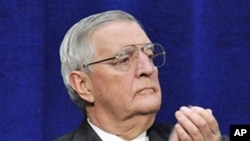The 1995 Great Hanshin earthquake in Japan, also called the Kobe earthquake, killed nearly 6,500 people and caused more than $100 billion in damage. Former U.S. Vice President Walter Mondale was the American Ambassador to Japan during the crisis. He talked with VOA’s Kane Farabaugh about how the United States and Japan worked together during the recovery, and how the current crisis in Japan might reshape world views on nuclear power.
Walter Mondale vividly remembers visiting Japan's Sendai region while he was U.S. ambassador during the mid-1990s. The region is now reeling from the destruction caused by a devastating 9.0 magnitude earthquake and resulting tsunami.
Mondale recalls visiting the now crippled nuclear reactors at the Fukushima-Daiichi power station, which is at the center of Japan's current crisis.
"One of the things I remember from that is being astounded at how clean and quiet it was, without tension, almost a perfect environment in how they were producing power for a nation that had none of their own energy locally without polluting the environment," said Walter Mondale. "And here it was, working. And yet now, 15 years later, we look at the same plants that are creating problems that are biblical in nature."
The crisis continues to unfold at the Fukushima plant, where workers are trying to cool the reactors to prevent the release of more radiation.
Mondale says he knows the fear and uncertainty that comes with such a crisis. He was U.S. vice president in 1979, when the most serious nuclear accident in American history occurred at the Three Mile Island power plant in Pennsylvania.
"For a couple of hours there, we were close to a meltdown at Three Mile Island, with consequences that are just horrible to contemplate and a reactor that was within easy reach of a couple of million Americans," said Mondale. "And how do you warn them without creating a mass and cataclysmic exodus of some kind?"
Although the United States avoided a worst-case scenario at Three Mile Island, an exodus has already occurred in Japan. Some 350,000 people are now housed in shelters outside the 20 kilometer evacuation zone near the Fukushima facility.
U.S. officials are calling for an even larger evacuation zone. Mondale says is important for the United States to evaluate the risks independently.
"We need to cooperate with the Japanese in every way we can," he said. "And we need to coordinate on public statements to the fullest extent possible. But if we think that American lives and the health of Americans are at risk, our first responsibility, while we do all these other steps and sustain working relationships, is to protect Americans."
Mondale says the current crisis reminds him of what he saw when he visited the 1995 Kobe earthquake disaster zone.
"As far as you could see, there were plastic tents situated over what was left of homes to provide the alternative to the roofs that had all disappeared in seconds," said Mondale. "There had been enormous fires throughout Kobe from an apparent leak in the gas system. And some people lost their lives by lighting a light in the dark and blowing up from gas fumes."
The devastation in Sendai is expected to eclipse the Kobe earthquake. But Mondale says both disasters have showcased the spirit and resilience of Japanese people.
"There were long lines for water, for food, many people needed health care - long lines," he said. "People were patient, quiet, stoic, I would say, but considerate of others."
As rescue workers search through the rubble along Japan's northeastern coast, the death toll has climbed into the tens of thousands. The World Bank say it might take five years for Japan to recover with costs running as high as $235 billion.
But the full impact of the March 11 earthquake and tsunami is still unknown. Walter Mondale points out the disaster already has raised global concerns about the safety of nuclear power.
"We’ve got a big question mark over nuclear power and whether it is safe," he said. "And whether there are things that we learn from this tragedy in the Sendai area that call for immediate correction - not just in Japan, but also around the world. Do we have plants that are astride earthquake zones? This is going to be a much discussed issue, and we face it together."
The U.S. Nuclear Regulatory Commission says it plans to launch a comprehensive safety review of nuclear facilities in the United States. There are 104 nuclear power plants across the country.
Former US VP: Japan Crisis Might Reshape Views on Nuclear Power





